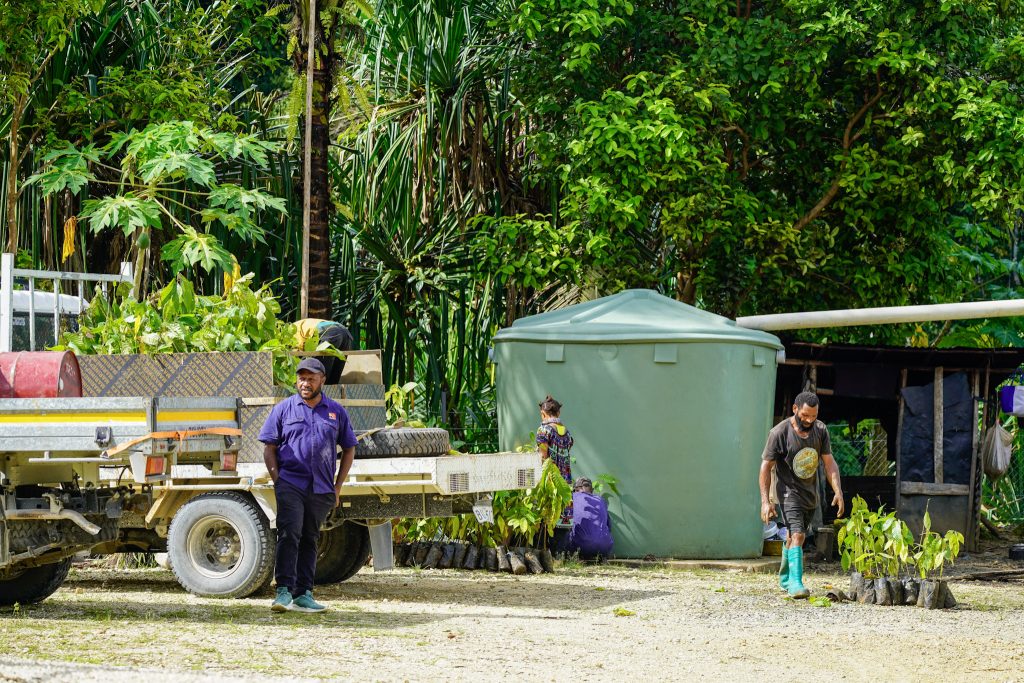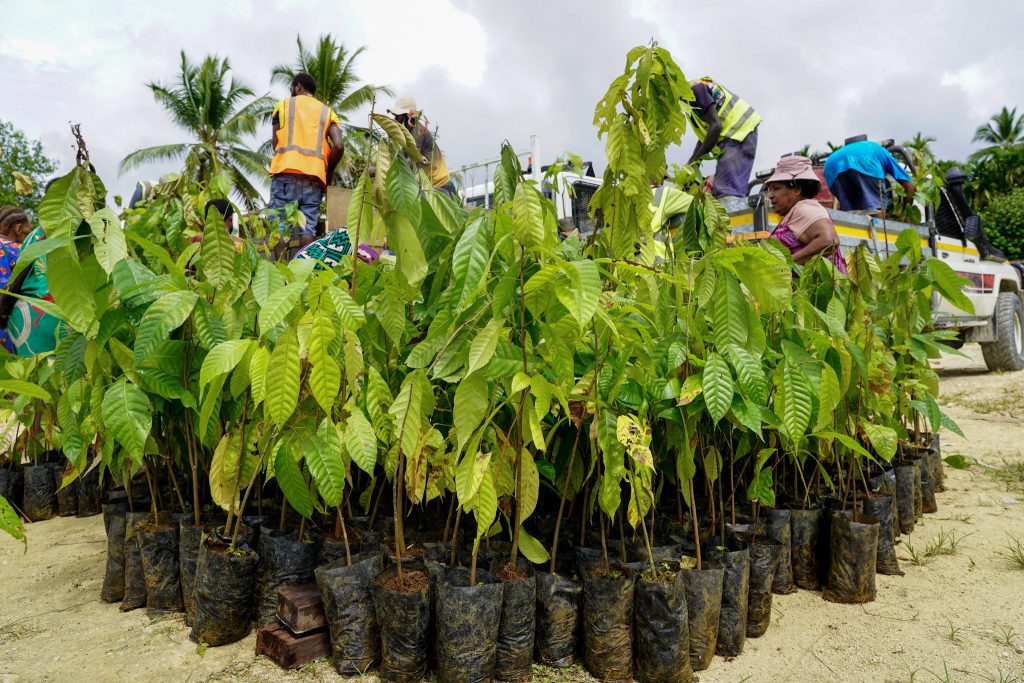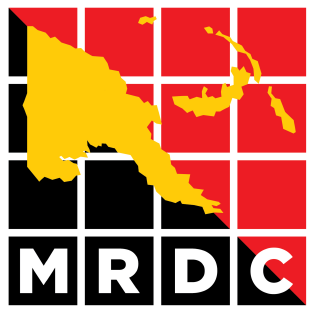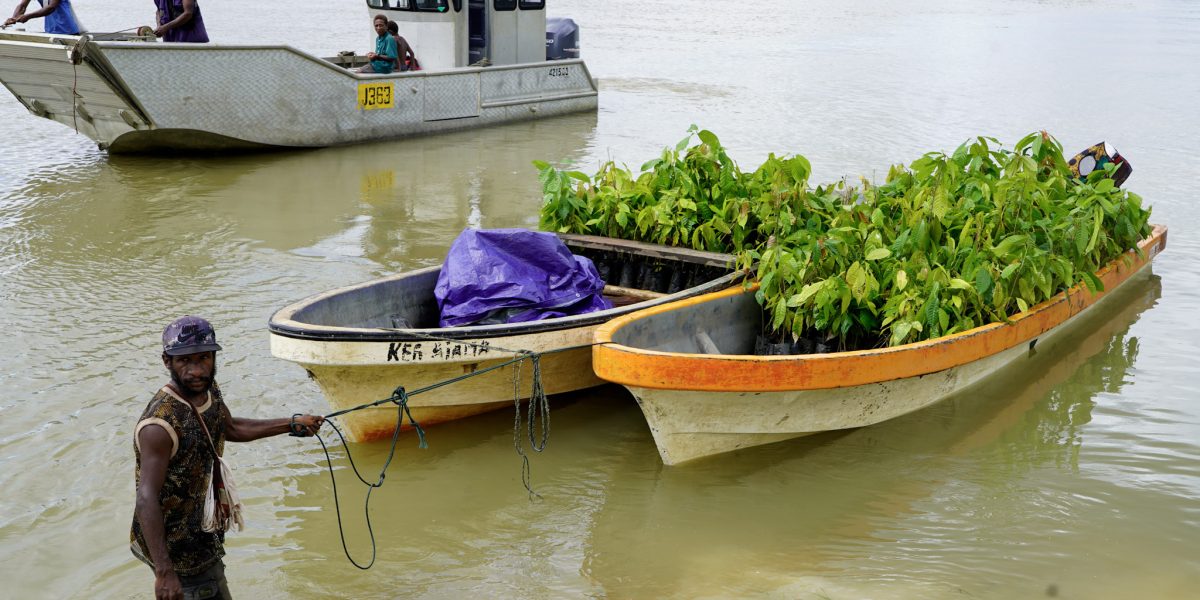MRDC’s Cocoa Project Expends from Gulf to Southern Highlands Province
This May, over 2,000 high-quality hybrid cocoa seedlings, propagated at Omati Cocoa Project in Kikori, Gulf Province, were successfully transported to communities in Gobe, Southern Highlands. This expansion is part of Mineral Resources Development Company (MRDC) program to establish sustainable agricultural economies beyond the lifespan of regional along its oil and gas footprints.
The Omati Cocoa Project, a collaborative venture between MRDC and its subsidiary Gas Resources Pipeline Limited (GRPL), serves as the nucleus of this agricultural program. Initiated with a K1 million investment in 2022, by MRDC through the PNGLNG Pipeline Limited board, the project has demonstrated the viability of large-scale, quality-focused cocoa production as a sustainable ‘life after mine’ strategy.
The Omati nursery, initially stocked with 1,000 select cocoa seeds from proven genetic lines from East New Britain, has evolved into a significant propagation center. It currently maintains a capacity of 50,000 seedlings, with plans for expansion to 100,000.
This capacity is important for meeting the growing demand from local farmers. A three-year period of development included the testing of up to 18 distinct cocoa varieties, evaluating them for yield potential, disease resistance, and suitability to the specific agro-ecological conditions of the region.
Augustine Mano, Managing Director of MRDC, emphasised the strategy of the agricultural program. “MRDC’s investment in the Omati Cocoa Project and its expansion to Gobe reflects our community investment commitment to our project communities,” Mr. Mano stated.
“We understand that sustainable economic development must look beyond resource extraction. By fostering agricultural enterprises, centered on high-value crops like cocoa, we are helping communities with the tools and resources for self-sufficiency and building a resilient future.”
The project’s agricultural integrity received a significant endorsement in 2024 with the official certification by the Cocoa Board of Papua New Guinea, affirming its adherence to national quality standards and best practices. Ongoing technical collaboration with the Department of Agriculture and Livestock (DAL) further provides farmers with access to essential agronomic expertise and extension services, ensuring the adoption of optimal cultivation techniques.
In Kikori, the project has already made substantial inroads, with over 85,000 seedlings distributed. Mr. Wauro Oumabe, PNGLNG Pipeline Ltd Director for Segment Seven in Kikori, outlined the local impact: “Approximately 500 farmers are now actively engaged in cocoa cultivation in Kikori, each receiving quality seedlings and support. The positive response and the evident success have fueled demand, leading to this expansion to Gobe. We anticipate further interest as communities witness the benefits of high-quality cocoa farming.”
The Gobe expansion has been met with strong local commitment. Mr. Matthew Sisimolu, Chairman of Petroleum Resources Gobe (PRG), a key landowner company whose community benefits MRDC helps manage, views the initiative as vital for the region’s agricultural future. “My primary objective as a leader is to steer our communities towards sustainable agricultural development as a primary economic driver,” said Mr. Sisimolu. “This cocoa project is a practical and promising pathway for our landowning communities.”
Chairman Sisimolu invested K6,000 towards the acquisition and distribution logistics of the initial 2,000 seedlings for Gobe. These seedlings are being distributed across several communities in Gobe Oil Project area, including Kaiam 1 and 2, Kaiam Ferry, Done, Siawiti, Waterfront, Baina, and Kantobo, targeting areas with suitable agricultural potential.
A core driver for participants is the shift from reliance on resource-related payments to the consistent, renewable income stream that well-managed cocoa farms can provide. Mrs. Kila Oumabe, who plays an active role in farmer mobilisation and training in Omati, particularly for women, stressed this economic transition. “Revenue from resource projects has a lifespan. Cocoa, however, is a perennial crop; it offers a sustainable income stream that can support families year after year.”
She elaborated on the socio-economic benefits from an agricultural perspective, “Access to consistent income from cash crops like cocoa directly impacts household food security and the ability to invest in education and health. For many women and marginalized households, who may have limited access to benefits from larger resource projects, cultivating their own cocoa plots offers a direct pathway to improved livelihoods. The initial nursery establishment saw a significant contribution from local women, who recognised the long-term potential of cocoa.”
Mr. Wauro Oumabe also highlighted the practical needs driving community interest: “In areas like ours, reliable income is essential for covering school fees, healthcare, and other basic necessities. The rising global market price for cocoa has further enhanced its appeal as a viable cash crop, capable of transforming local economies if grown to quality standards.”
Future for the cocoa initiative focuses on strengthening the entire agricultural value chain. “A comprehensive five-year development plan has been submitted to MRDC,” Mr. Wauro Oumabe noted. “A key feature of this plan is the proposed establishment of a processing facility. Our aim is to empower communities to move up the value chain from merely selling raw beans to producing processed cocoa, thereby retaining more value locally.”
“Such a facility would not only improve post-harvest handling and quality control but also create new employment opportunities, skills development in processing and grading, and open avenues for niche marketing of regionally branded cocoa products. This aligns with broader national goals of increasing domestic value-addition in the agricultural sector.” Mr Wauro said.

Cocoa seedling being delivered to Gobe

Matured cocoa seedling collected ready to be delivered to Gobe


(2) Comments